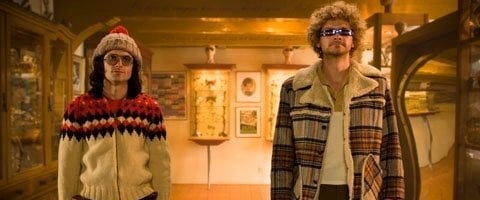Similar to a novelty pair of socks sitting inside the most bizarre Christmas wrapping possible, Bunny and the Bull is a flair-filled gift worth unveiling and eventually discarding. After you've shown your friends, of course. It is a movie so amazingly British, I paused it to hit the loo, instead of going to the bathroom like I normally do. Artistically surreal, witty, hilarious, and gloomy all describe the elements with which writer/director Paul King surrounded his rather mundane story. If you get the feeling that I liked this movie, but didn't really like this movie, it's no bull. Known for his unglued visual style on the superb British cult series, The Mighty Boosh, Paul King is a young director miles ahead of his contemporaries. His first foray into film proper, Bunny and the Bull focuses on Stephen (Edward Hogg), an agoraphobic shell of a human being, stuck in a dismal routine day after day after day. We know this because the vanishing narrator tells us this, one sign of a young director. Another sign: the film seems to have "centering" at the forefront of its entire cinematography, as 90% of the scenes have a direct visual line vertically splitting it in half. This is general criticism, as it works splendidly in some scenes, but in others, I was reminded of Zack Braff's similar motifs in Garden State, and I really didn't want to think of that movie. I won't mention it again.
The apartment that Stephen doesn't leave is wonderfully conceived, a testament to a man who has spent a year in avoidance of discarding rubbish, adding to what had to already be an obsessive collection. There is barely room to walk around, as the floors-to-ceilings are covered, mostly with labeled boxes containing the minutiae of a solitary life, such as hundreds of combs. Hiding in some of these boxes are the memories of what has driven him to his self-convicted form of house arrest. The previous year, Stephen and his polar opposite friend, Bunny (Simon Farnaby), took a road trip across Europe that imaginatively frames Stephen's spiraling decent. It's assumed you'll be able to believe in a friendship between two guys with nothing in common who don't agree on anything. But the trip is funded with Bunny's gambling winnings, bet on a long-shot horse just because his jockey was the most aggressive looking of the bunch. Inspired bits like that go a long way toward making up for the film's shortcomings.
Bunny is pure whimsy, desire as his muse. A compulsive drunk and risk-taker, he would be a more enjoyable subject whose sexual exploits might make for a more even film. However, King is intent of offering a more in-depth story, so there is an ever-present rift between the emotions provoked. For a man who owns a wearable condom dispenser, Stephen is entirely too sniveling and melancholy. Yes, I know he's the anchor holding down this ship of fools, but Bunny is so much more fucking awesome.
Essentially, Stephen wants to get away because a long-sought-after girl has spurned him. Soon into the trip, the guys meet Eloisa, a sassy Spanish waitress whose free spirit Stephen takes to immediately. (Read as: Eloisa is a female Bunny. Context.) It is decided the trio will travel to Eloisa's hometown to take part in a fiesta, and Bunny soon decides that he shall fight a bull while in Spain. So they do that, taking on obstacles and forming a fractured love triangle in the process. For the Boosh fans, Noel Fielding plays Eloisa's devilish matador brother. And before we get to him, Julian Barratt's Atilla strides in, making everyone uncomfortable with a personality drowning in bestiality. Richard Ayoade also pops up for a short bit. Since the plot is so slight, hinged on different set pieces episodically, there isn't more to describe without laying it all out. For the record, I could not stand Eloisa. More than once, she shows disbelief by using the phrase, "You're fucking my face," which sounds extremely awkward with her accent and delivery. In a movie with Simon Farnaby standing full-frontal nude, an idiotic catchphrase is the most gratuitous thing on display.
Characters aside, Bunny and the Bull has a brazenly original visual style that is the film's strongest attraction. I'm not certain my words could do King's work justice. Once viewers leave Stephen's apartment and step into the past, the sets occasionally become deconstructed into avatars of everyday scenery and props. The guys sit at a table in front of an aquarium filled with crudely drawn paper cut-outs of fish swimming through non-water. For scenes filmed inside of a vehicle, all of the backgrounds seen outside the windows are similarly two-dimensional. We're in an era where movies are filmed so far away from their on-screen locations, only to be filled in with CGI in post-production. King also creates the world that his characters inhabit, but with the childlike jubilance that the majority of filmmakers choose to ignore.
When the sets and props are physically present, none of the artistic magic is lost. Much of this is due to the fact that the scenes are occurring in Stephen's memory banks, so the lines between objectivity and subjectivity are blurred. The treasures he finds in the boxes, such as a snow globe, become interwoven with the direction. When Stephen is in his apartment, looking at a wall of clocks, we're transported to a fair he and Eloisa visited where all the rides and attractions are made from the gears and wheels of a clock's inner workings. As the movie draws closer to its end, this blurring becomes more apparent, as there are often walls made of boxes and stacks of books, much like those inside the apartment. The strains of sanity are examined with maturity, even while wallowing in lowbrow waters. It's a high-point for eccentric comedies, and out-Gondrys Gondry a time or two.
There are many things I concede to Bunny and the Bull, but having a fully realized story isn't one of them. Within it, Paul King has more genius strokes than Einstein's right hand, but the foundation needs to be sturdier in order to hold up all of the madcap emotional see-saw that is erected on top. I loved the cast, I laughed my ass off, I was affected by sadness when called for, and I didn't mind the Spirograph shifts in tone. Something about the A-B-C simplicity of the major plot points was just too disappointing, especially since The Mighty Boosh plots were as far-flung as they were. A success, surely, Bunny and the Bull is only a glimpse of what Paul King will bring to cinematic landscapes in the future. This DVD is depressingly empty, seeing as how almost everyone involved in the film is actually worth listening to. Are you interested in "Interviews" which last about a minute apiece? That's here. And if you wanted to see fewer than 10 minutes of behind-the-scenes footage, that's here, too. It's a solid 15 minutes or so, don't get me wrong. But get me another movie to watch now.
Your Daily Blend of Entertainment News

Nick is a Cajun Country native and an Assistant Managing Editor with a focus on TV and features. His humble origin story with CinemaBlend began all the way back in the pre-streaming era, circa 2009, as a freelancing DVD reviewer and TV recapper. Nick leapfrogged over to the small screen to cover more and more television news and interviews, eventually taking over the section for the current era and covering topics like Yellowstone, The Walking Dead and horror. Born in Louisiana and currently living in Texas — Who Dat Nation over America’s Team all day, all night — Nick spent several years in the hospitality industry, and also worked as a 911 operator. If you ever happened to hear his music or read his comics/short stories, you have his sympathy.

